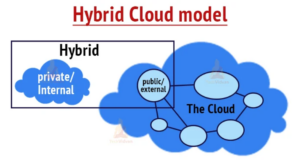In today’s dynamic landscape, enterprises are continuously looking for cutting edge solutions to stay efficient, secure, and competitive. Technologies like cloud computing has revolutionized the way businesses handle their applications, data, and infrastructure. Among the different cloud deployment models, hybrid cloud stands out with its unmatched scalability and flexibility. According to a prediction by Gartner, about 90% of the businesses will embrace a hybrid infrastructure management model by 2024. In this blog, we will explore why hybrid cloud is essential for companies big or small, and why it is regarded as the future of IT. Before we delve deep into the blog, let us understand hybrid cloud in detail.
What is a Hybrid Cloud?
Let us begin with a brief introduction. Hybrid cloud is a computing ecosystem that integrates both private and public cloud environments. This arrangement enables enterprises to relish the best of both worlds – capitalizing on the cost efficiencies and scalability of public cloud while leveraging the control and security provided by private cloud. A hybrid cloud model empowers enterprises to allot resources efficiently, keeping mission-critical applications on private cloud and non-critical applications on public cloud.

Source: Hybrid Cloud – Everything you need to Know – TechVidvan
How Does a Hybrid Cloud Operates?
In a hybrid cloud setting, you have the benefit of a single platform to manage the mix of private and public cloud resources. This framework comprises integrated tools that facilitate policy-based management, handling the duplication and transfer of data between the cloud environments and on-site infrastructure. Disaster recovery planning is one of the key areas where this applies. Here data is copied regularly from the local setting to public cloud, which can be carried out either at scheduled intervals or continuously, according to the operational requirements.
Effective communication between disparate environments is important in hybrid cloud, which is often accomplished via cloud APIs. These APIs are necessary for assuring seamless communication between the cloud services and on-premises setup. Hence it is essential to have an on-premises arrangement which is in sync with the APIs to leverage the advantages of a hybrid cloud framework. Further, this compatibility ensures efficient integration and management of different cloud services, boosting the overall efficacy of your cloud framework.
Here are seven strong reasons why hybrid cloud is regarded as the future of IT.
1. Compliance and Data Security
Compliance and data security are of prime importance in today’s regulatory setting. Those businesses operating in regulated industries such as finance or healthcare are reluctant to shift their operations to public cloud due to security reasons. With hybrid cloud, you can keep critical applications and confidential data on private cloud, while using public cloud for insignificant workloads. In this manner, you can exercise stringent control over your valued assets.
2. Flexibility and Scalability
One of the primary reasons why hybrid cloud is gaining a strong foothold is its unparalleled flexibility. Businesses can impeccably scale their assets up or down to meet their changing requirements. When there is a surge in traffic, the hybrid cloud can leverage the public cloud assets to manage the load, assuring that your services and applications are accessible and responsive. On the contrary, during idle periods, you can opt to scale down to cut costs. The scalability feature greatly helps businesses to adapt to the changing market conditions.
3. Cost Efficiency
Hybrid cloud promotes cost-effectiveness which enables you to manage your IT setup. Businesses can substantially minimize their IT expenditure through proper resource allocation and by employing the pay-as-you-go approach of public cloud. Further, the right kind of resource allocation avoids over-provisioning, which can drain the budgets considerably.
4. Competitive Advantage and Inventiveness
In today’s agile business ecosystem, constant innovation is needed to stay at the competitive edge. Hybrid cloud enables businesses to leverage the full potential of emergent technologies such as Machine Learning, Artificial Intelligence, and Internet of Things (IoT) to stay competitive.
5. Business Continuity and Disaster Recovery
Each business must be ready for the unforeseen. Hybrid cloud makes business continuity and disaster recovery planning more efficient, accessible, and smooth. You can reproduce applications and data to public cloud, thereby confirming that the critical systems are accessible even during an outage. This aspect can act as a lifesaver when you are hit by unanticipated disasters.
6. Integration and Simplified Management
Hybrid cloud simplifies the process of managing a diversified IT infrastructure. Modern hybrid cloud frameworks provide integrated tools that offer control and visibility across both public and private cloud environments. This streamlined approach enables organizations to have reliable practices and policies, minimizing the administrative overhead. Further, a hybrid cloud arrangement promotes continuous integration with the existing on-premises applications and systems. This approach guarantees that enterprises can make full use of their existing investments while slowly adopting the cloud technologies. The capability to blend legacy models with modern cloud technologies facilitates an easy transition and reduces disruptions during migration.
7. Availability and Optimized Performance
Hybrid cloud empowers enterprises to improve accessibility and performance by utilizing the capabilities of both the clouds. While public clouds are used to handle extensive data processing and non-critical tasks, private clouds are used to manage mission-critical tasks that require low latency and high performance. Further, hybrid cloud offers load balancing abilities which helps to manage traffic and maintain steady performance during the busy hours.
Hybrid Cloud – Use Cases
Now let us have a look at some of the use cases of hybrid cloud.
- Cloud Bursting
Cloud bursting is one of the common use cases of hybrid cloud. Here, a resource or application runs in private cloud till there is an upsurge in demand like in the case of a retail site during a lightning sale, where at a certain point, it depends on public cloud to get additional resources. This approach enables enterprises to manage a spike in demand without utilizing any additional on-premises resources.
- Data Analytics
Organizations can save and process confidential information on-premises, while utilizing the scalability and power of public cloud, for performing analytics jobs using hybrid cloud. This approach enables enterprises to leverage the high computing power offered by public cloud, while safeguarding the data.
- Hybrid Data Storage
This data management method includes both cloud-based and local storage. This approach enables organizations to save sensitive data on-premises, while using cloud to store less-sensitive data. This has proven to be a cost-efficient method to handle huge amount of data, as cloud storage is regarded as a cheaper option compared to on-premises to store massive amount of data.
- High Performance Computing (HPC)
High Performance Computing is used for complicated tasks such as weather prediction, biomedical simulation, etc., and needs huge computing power. A hybrid cloud model empowers enterprises to utilize their public cloud for HPC tasks and private cloud for normal, less-intensive tasks.
What are the Advantages of Hybrid Cloud?
Hybrid cloud has several advantages. Here are a select few:
- Minimized latency and enhanced performance: Enterprises can enhance application performance and decrease latency considerably by installing applications closer to users and data.
- Efficient application governance: Enterprises can have substantial flexibility where they install their applications by capitalizing on the capabilities of both public and private clouds.
- Flexible operations: Hybrid cloud offers businesses the flexibility to scale down or up their resources according to the requirements via public cloud, without any direct investments in on-premises data centers.
- Improved ROI: Enterprises can enhance their IT expenditure by utilizing the cost-efficient nature of public cloud for non-critical operations and conserving private cloud for critical operations.
Wrapping it up
As we envision the future of technology in business, it becomes evident that hybrid cloud will play a key role in steering innovation, growth, and efficiency. Hybrid cloud with its excellent capabilities such as cost efficiency, security, flexibility, scalability, and many more, is highly preferred by businesses big and small to stay ahead in the competitive market.
As a leading cloud solutions provider with over 26 years of industry expertise, Milestone is well-equipped to support you to harness the potential of hybrid cloud and achieve your business goals.
If you have any questions, feel free to contact us at itsolutions@milestone.tech.




